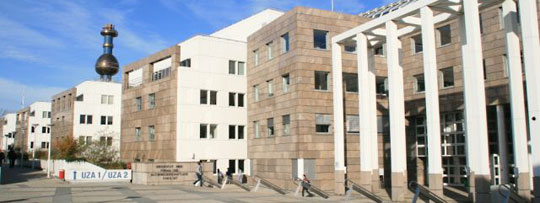Mittwoch, 18. Mai 2016, 17:15 - 18:15 iCal
Guest Lectury by Prof.Dr. Klaus GROSCHNER/MU Graz
"The two faces of TRPC proteins - understanding their function in immune cells and neurons”
UZA II, Pharmaziegebäude, Seminarroom 2D 358
Althanstraße 14, 1090 Wien
Lecture
"The two faces of TRPC proteins - understanding their function in immune cells and neurons”
by Univ. Prof. Dr. Klaus GROSCHNER
Institute of Biophysics, Medical University of Graz
klaus.groschner@medunigraz.at; www.medunigraz.at/DK_MCD/Faculty_Groschner.htm
on: Wednesday, May 18th 2016; 17:15 (05:15 pm)
at: UZA II, Althanstraße 14, 1090 Vienna;
Seminarroom 2D 358 (Dept. of Pharmacology and Toxicology)
Abstract: Canonical transient receptor potential (TRPC) proteins serve the generation of spatially restricted Ca2+ signals to control diverse cellular functions, including excitation-transcription (E-T), excitation-secretion (E-S) and excitation-contraction (E-C) coupling. Early investigations on the molecular principles of TRPC signaling implicated a tight link between TRPC channels and store-operated Ca2+ entry (SOCE), which is essential for E-T coupling in many cell types. Later on, a more complex role of these nonselective cation channel proteins emerged. Depending on the cellular localization within signaling micro(nano)domains, TRPC proteins appear to govern a variety of down-stream signaling pathways via either Ca2+ or Na+ entry, primarily in response to the hydrolysis of membrane phosphoinositides (PIP2). More recently, TRPC proteins were uncovered as dynamic scaffolds that interact physically with a wide range of molecules involved in endoplasmic reticulum - plasma membrane (ER-PM) communication, and to tether downstream targets of Ca2+ signaling to the plasma membrane. Our investigation of the role of native TRPC3 in mast cells and hippocampal neuron revealed two strikingly divergent cellular functions of this channel protein. We identified TRPC3 as a scaffold essential for mast cell transcriptional activation and as a cation channel crucial for rapid inhibitory control of hippocampal activity. Our current understanding of the molecular basis for these divergent functions of TRPC3 in mast cells and neurons will be discussed
Zur Webseite der Veranstaltung
Veranstalter
Kontakt
Susanne Menschik-Zunzer
Department of Pharmacology and Toxicology
DK Molecular Drug Targets
01 5277 55320
susanne.menschik-zunzer@univie.ac.at, office.moltag@univie.ac.at
Erstellt am Freitag, 06. Mai 2016, 10:22
Letzte Änderung am Montag, 09. Mai 2016, 08:51

